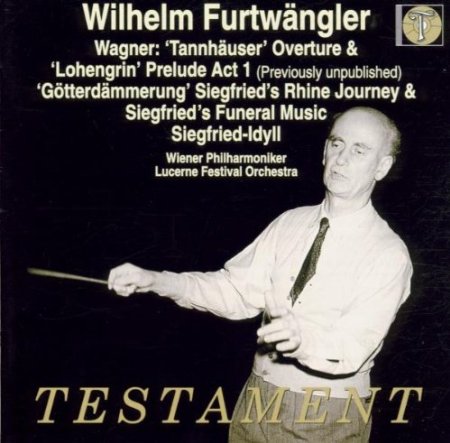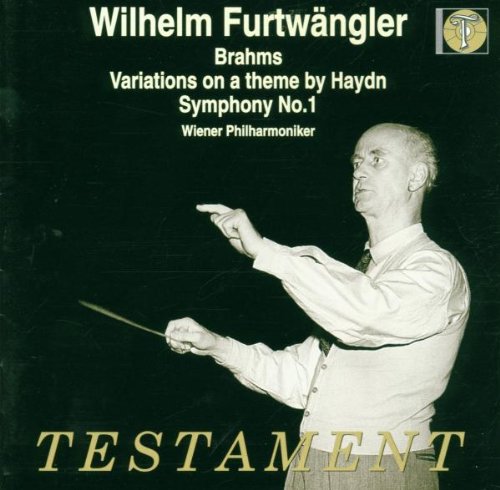Wilhelm Furtwängler - Wagner
View record and artist detailsRecord and Artist Details
Composer or Director: Richard Wagner
Genre:
Orchestral
Label: Testament
Magazine Review Date: 8/1998
Media Format: CD or Download
Media Runtime: 61
Mastering:
Mono
ADD
Catalogue Number: SBT1141

Tracks:
| Composition | Artist Credit |
|---|---|
| Lohengrin, Movement: Prelude |
Richard Wagner, Composer
Lucerne Festival Orchestra Richard Wagner, Composer Wilhelm Furtwängler, Conductor |
| Tannhäuser, Movement: Overture |
Richard Wagner, Composer
Richard Wagner, Composer Vienna Philharmonic Orchestra Wilhelm Furtwängler, Conductor |
| Siegfried Idyll |
Richard Wagner, Composer
Richard Wagner, Composer Vienna Philharmonic Orchestra Wilhelm Furtwängler, Conductor |
| (Der) Ring des Nibelungen: Part 4, 'Götterdämmerung', Movement: orchestral interlude (Siegfried's Rhine Journey) |
Richard Wagner, Composer
Richard Wagner, Composer Vienna Philharmonic Orchestra Wilhelm Furtwängler, Conductor |
| (Der) Ring des Nibelungen: Part 4, 'Götterdämmerung', Movement: Siegfried's funeral march |
Richard Wagner, Composer
Richard Wagner, Composer Vienna Philharmonic Orchestra Wilhelm Furtwängler, Conductor |
Composer or Director: Anton Bruckner
Label: Testament
Magazine Review Date: 8/1998
Media Format: CD or Download
Media Runtime: 79
Mastering:
Mono
ADD
Catalogue Number: SBT1143

Tracks:
| Composition | Artist Credit |
|---|---|
| Symphony No. 8 |
Anton Bruckner, Composer
Anton Bruckner, Composer Berlin Philharmonic Orchestra Wilhelm Furtwängler, Conductor |
Composer or Director: Johannes Brahms
Genre:
Orchestral
Label: Testament
Magazine Review Date: 8/1998
Media Format: CD or Download
Media Runtime: 68
Mastering:
Mono
ADD
Catalogue Number: SBT1142

Tracks:
| Composition | Artist Credit |
|---|---|
| Symphony No. 1 |
Johannes Brahms, Composer
Johannes Brahms, Composer Vienna Philharmonic Orchestra Wilhelm Furtwängler, Conductor |
| Variations on a Theme by Haydn, 'St Antoni Chorale |
Johannes Brahms, Composer
Johannes Brahms, Composer Vienna Philharmonic Orchestra Wilhelm Furtwängler, Conductor |
Author: John Steane
This Bruckner Eighth is the second of three performances of the symphony Furtwangler conducted on consecutive nights in Berlin in March 1949. The first wasn’t recorded, and the third, given before probably one of Berlin’s noisiest audiences, was recently issued by EMI in a box of historic Bruckner recordings, “Furtwangler’s essentially neurotic view of the work spurred to new levels of intensity by the encircling mayhem” wrote RO in March 1997. There was no audience at the second performance, reissued here on Testament, and the result is a little less neurotic, but it remains a high-flown, often melodramatic and ultimately dislocating experience (with an especially bleak first movement). Perhaps those impressions are heightened by the dry acoustic of the Berlin-Dahlem Gemeindehaus, and the way recording levels can be insensitively raised for quieter sections. Even so, this isn’t Furtwangler and the Berlin players at their best. Despite some exalted playing in the Adagio, tuning, ensemble and balance are rarely as good as one has a right to expect them to be; there are snatched notes in the Scherzo, and what appear to be lapses of concentration (for example, at the end of the first movement).
The Lohengrin Act 1 Prelude opens the Wagner disc of studio recordings, the only item of five – all Legge produced, and from the late 1940s – with the Lucerne Festival Orchestra. Lest that cause concern, let me say that ensemble tuning is far better than in the Berlin Bruckner, and the way the Swiss brass crescendo on the upbeat to the climactic delivery of the hymn must rate as among the most elating of all Furtwangler moments. Why this and the Tannhauser Overture have never been issued before remains a mystery, as probably do all the reasons why, in the latter piece, the Vienna Philharmonic sound on fire for Furtwangler and on duty for, say, Knappertsbusch in 1953 (Decca, 10/53 – nla). Siegfried’s Rhine Journey evolves in one seamless sweep, barring the split-second but disconcerting rhythmic hiatus at the moment of take-off (4'51''). And mercifully Furtwangler doesn’t tag on the trite concert ending (as did Reiner and Toscanini), giving a chance to wonder at the uniquely resonant low brass sounds of the VPO as we approach the Gibichung Hall. Then on to the Funeral March, every dark sound fully charting the depths, every phrase carrying special import, and, as in the Siegfried Idyll, the occasional passage reminding us of standards of tuning of the day. The latter account, Furtwangler’s only recording of the piece, engages rather than diverts and charms, with Vienna string playing typically sweet and rapturous, and “Siegfried, Hope of the World” tensely built to an almost delirious climax. Depth, presence and a very naturally achieved clarity characterize all these Musikverein Wagner recordings, and 78 sources only occasionally make their presence felt. '
Discover the world's largest classical music catalogue with Presto Music.

Gramophone Digital Club
- Digital Edition
- Digital Archive
- Reviews Database
- Full website access
From £8.75 / month
Subscribe
Gramophone Full Club
- Print Edition
- Digital Edition
- Digital Archive
- Reviews Database
- Full website access
From £11.00 / month
Subscribe
If you are a library, university or other organisation that would be interested in an institutional subscription to Gramophone please click here for further information.




